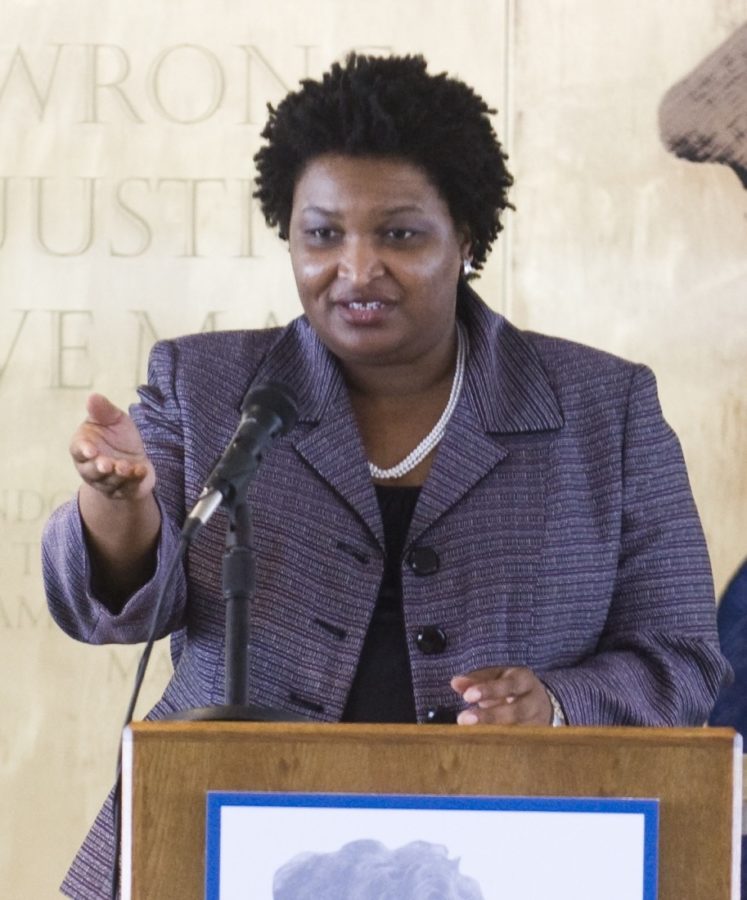Stacey Abrams becomes the first black woman to deliver State of the Union response
Stacey Abrams
February 6, 2019
Former Georgia gubernatorial candidate Stacey Abrams gave the Democratic response to President Trump’s State of the Union address Tuesday.
This is the nation’s first response delivered by a black woman and a non-elected official.
“America has stumbled time and again on its quest for justice and equality,” Abrams said. “But with each generation we have revisited our fundamental truths, and where we falter, we make amends.”
Benjamin Whittington, Iowa State student and vice president of Politics at ISU, expressed the significance of selecting Abrams for a speech that garners a national and international audience.
“Representation for all people, and not only for people of color, is important,” Whittington said. “But seeing a black woman around the age of my mom giving an important political speech is very inspiring.”
Upon a platform that historically has left out women of color, Abrams called attention to a the foundation of American democracy.
“Let’s be clear: voter suppression is real,” Abrams said. “From making it harder to register and stay on the rolls, to moving and closing polls, to rejecting lawful ballots — we can no longer ignore these threats to democracy.”
Taylor Blair, president of College Democrats at Iowa State University, witnesses first-hand the effect these tactics can have.
“I have spoken with students who have been unable to vote [because of these tactics],” Blair said. “With Iowa’s new Voter ID Law now in full effect, this will increasingly become a problem here in Iowa.”
Abrams has led the charge for voting rights, making voting distortions a central focus in her 2018 campaign for governor.
“We must reject the cynicism that says allowing every eligible vote to be cast and counted is a power grab,” Abrams said. “The foundation of our moral leadership around the globe is free and fair elections, where voters pick their leaders, not where politicians pick their voters.”
While Abrams employed a personal narrative, highlighting an understanding of hardship and scarcity, she didn’t hold back on calling for policy from her congressional audience.
“Our leaders must protect the progress we’ve made and commit to expanding healthcare and lowering costs for everyone,” Abrams said. “[American’s are] forced to choose between buying medicine, or paying rent.”
Abrams cited a strong hesitancy that still grasps many states and their ability to provide adequate healthcare to their citizens.
“Maternal mortality rates show that mothers, especially black mothers, risk death to give birth,” Abrams said. “In 14 states our leaders refuse to expand medicaid … which could save rural hospitals, save economies and save lives.”
In contrast to the rhetoric maintained during the State of the Union, Abrams advocated for humanity at the border.
“Compassionate treatment at the border is not the same as open borders,” Abrams said.
Steffen Schmidt, Lucken Endowed Professor of Political Science at Iowa State, said Abrams speech is an excellent representation of where the Democratic Party wants to move towards.
“Democrats stand ready to effectively secure our ports and borders, but we must all embrace … that America is made stronger by the presence immigrants, not walls,” Abrams said.
In the past, those chosen to deliver the opposition response tend to represent party hopefuls or populations to whom the party wants to speak.
“I have heard many say Stacey Abrams is the future of the party, but really she represents the present, long overdue,” Blair said. “Women, specifically women of color, have always been the backbone of the Democratic coalition and they’re finally receiving the credit and notoriety they deserve.”

















